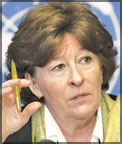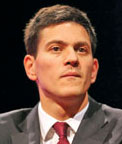Latest ICG report runs off the rails - Part I
Trying to punish Lanka for resolving deadly conflict
the Sri Lankan way:
H L D Mahindapala
If there is one report that the Government of
Sri Lanka must dismiss without batting an eyelid and summarily put
through the nearest shredder in the office of the External Affairs it is
Asia Report No. 191 of May 17, 2010 produced by the International Crisis
Group (ICG) headed by three Co-Chairs: Lord (Christopher) Patten,
Chancellor of Oxford University, Thomas R Pickering, Former US
Ambassador to the UN and President and CEO Louise Arbour.
Asia report titled ‘War Crimes in Sri Lanka’ carries the ICG seal of
approval with a huge claim to be working through field-based analysis
and high-level advocacy (listen to this!) to prevent and resolve deadly
conflict. With all the impressive VVIP titles on its list of advisors
(including Kofi Annan) the first question that comes to mind is: why is
the ICG focusing with almost a demonic fervour on Sri Lanka, which has
resolved its deadly conflict without the help of the ICG specialists on
conflict resolution, when their field-based analyses have failed to
resolve so many deadly conflicts (Iraq, Afghanistan, Somalia, Palestine,
Sudan etc.) plaguing world peace and stability?

Lord (Christopher) Patten |

Thomas R Pickering |

Louise Arbour |

David Milliband |

Bernard Kouchner |
The main thrust of the ICG report is to question the last days of the
war when Sri Lanka rejected the interventions of David Milliband and
Bernard Kouchener who, one fine day, turned up at the doorstep of Sri
Lanka to tell the natives how to conduct their war against the deadliest
terrorist of the world (CIA report). This is an issue that should be
dealt in some detail later. For the present, the focus should be on some
of the motives of the latest attack on Sri Lanka by the ICG.
Is its field-based analysis and high-level advocacy a genuine attempt
to prevent and resolve deadly conflicts or is the ICG another partisan
agent acting in the name of peace, stability and morality to actually
put maximum pressure on Sri Lanka to obey its political agenda? How can
the latest report on Sri Lanka help to achieve the objective of
preventing and resolving deadly conflict when in reality it is stoking
the embers and ashes of conflict?
Vadukoddai War
Sri Lanka is the only known nation in this age of terrorism age to
have resolved a 33-year-old deadly conflict that began on May 14, 1976
with the declaration of the Vadukoddai War by the Tamil leadership of
Jaffna. And yet the ICG report argues, in the main, that the Sri Lankan
option i.e, the formula adopted to resolve the conflict should not be
followed by other nations. In fact, it is urging the international
community to punish Sri Lanka for doing it the Sri Lankan way.
Referring to the Sri Lankan model as an assault on international
humanitarian law ICG states: Since the end of the war, a number of
commentators and officials have expressed admiration for the way the
government defeated the LTTE. The Sri Lanka option a tough military
response, a refusal to countenance a political solution, the dismissal
of international concerns and a willingness to kill large numbers of
civilians has been discussed as an answer to insurgencies and violent
groups in a number of countries including Israel, Myanmar, Thailand,
Nepal, Pakistan, India, Colombia and the Philippines. (p. 62).
Military response
First, the complaint about a tough military response. Having failed
in its soft military responses earlier what is wrong in Sri Lanka
adopting a tough military response to end the war waged by the deadliest
terrorist outfit in the world?
Besides, has the ICG raised serious objections to the tough military
responses of NATO and USA in Afghanistan and Iraq? Could it be that the
ICG is under the impression that, unlike the Sri Lankan Forces, the
US/NATO forces are distributing sponge cakes and roses to the armed
Talibans and not fighting with bullets, artillery, drones, air raids and
helicopters? Furthermore, if it is moral for US/NATO Forces to fight an
enemy miles away from their home to capture of land which is not theirs,
or for regime changes, why is ICG kicking up such a fuss about Sri
Lankan soldiers defending their own territory, sovereignty and their own
people, in the best manner they know? If US/NATO Forces can fight the
Talibans in all parts of the world using all available force why is it
wrong for Sri Lankan forces to fight the Tamil Tiger Talibans
terrorizing Tamils, Muslims and Sinhalese in Sri Lanka?
US/NATO Forces
Besides, since Lord Patten is so much concerned with the morality of
fighting wars according to their morality and laws, can he tell the Sri
Lankan the first or the last occasion when he lifted his voice against
the tough military responses of the NATO Force recruited from the EU at
the time when he was the European Commissioner for External Relations?
If pursuing tough responses to subjugate foreign rebels is good enough
for Lord Patten why is it bad for Sri Lankan lads and lasses to fight in
defence of their own Motherland land? If restoring democracy is the
ultimate aim for US/NATO Forces why is it wrong for the Sri Lankan
Forces to effect a regime change in the Vanni and restore democracy,
however defective it may be?
Every item (except the tough military response) listed by the ICG in
the Sri Lankan option is a distortion of the realities faced by the
Government of Sri Lanka. Put simply, the ICG is using disingenuous
excuses to justify its doctored report driven by an agenda of its own.
On what basis can the ICG claim that there was a refusal to countenance
a political solution when the Sri Lankan Government had accepted the
political solution, first, by the Indians in the Indo-Sri Lanka
Agreement?
Second, how can the ICG blame the Sri Lanka Government when the
international community negotiated, drafted and pushed the Ceasefire
Agreement (CFA) which was accepted willingly and subserviently by the
Ranil Wickremasinghe Government with hosannas sung in its praise by the
NGOs and the INGOs? Was it Sri Lankan Governments that refused to
countenance political solutions or was it the sole representative of the
Tamils? Why blame the Sri Lankan Government when the Tamil leaders
sabotaged all the well laid plans of mice and men in the international
community?
It is absolutely perverse for the ICG to accuse Sri Lanka of
dismissing international concerns when, indeed, Sri Lanka had accepted
the solution recommended by the international community and pursued
every provision of the CFA. In fact the CFA was a blue print produced by
the international community. It is after the failure of the highly
recommended international interventions that the Government opted for
the Sri Lankan option. The only solution that worked and also could have
worked was the Sri Lankan option, according to the best-informed
political and military analysts.
The visible results in the post-conflict phase prove it beyond doubt.
So what is the earthly purpose of ICG labouring to deny it unless it is
to push its own political agenda which has no relevance to the current
political landscape or to the future?
International community
The ICG, ignoring the repeated failures of the international
community to bring about lasting peace, now turns around and complains
that Sri Lanka has rejected the unrealistic and unacceptable solution
proposed by the international community to stop the war when the Tigers
were on the brink of defeat. This would be like Lord Patten recommending
to Churchill to stop the war and give breathing space to Hitler when the
Allied Forces were advancing into Berlin.
Stopping the war at that critical moment, following the advice of
Bernard Kouchner and David Milliband, without guarantees of the Tigers
laying down their arms, would have been the most evil act that would
have perpetuated the war in overt and covert ways, leading to more
deaths and destruction. Besides, the international community was
recommending to Sri Lanka what they had never done in any of their wars
or will every do in their wars to come. This is another reasons why Sri
Lanka should dispatch the ICG report to the nearest shredder.
Consider also Lord Pattens morality from his knowledge and experience
of European wars. Has he ever protested against decorating Bomber Harris
with military and state honours for flattening Dresden and killing an
estimated 300,000 German civilians in the last days of World War II, eh?
Has American Ambassador Thomas Pickering condemned the inhuman bombing
of Hiroshima (140,000 in one blast) and Nagasaki (85,000 in the second
blast) when it was well-known that there was no need to use the atom
bombs as Japan was sinking on its last legs? That is how the pious
moralists in the ICG ended their wars. So on what moral grounds can Lord
Patten, Thomas Pickering, Louise Arbour point a finger at Sri Lanka for
ending the war on questionable and unsubstantiated casualty figures? On
this ground of hypocrisy alone Sri Lanka should have no hesitation in
putting the ICG report through the shredder.
Futile peace talks
On the balance of consequences, ending the war in Nandikadal is the
best thing that happened to Sri Lanka since independence. It has put an
end to the slaughter and terror perpetuated by the Tamil Tiger Talibans.
Without mentioning that all other options regional (Indian)
solutions, international solution (Oslo Accord), a series of futile
peace talks in various world capitals had failed to produce the lasting
peace for the war-weary Sri Lankan the ICG pundits harp only on the Sri
Lankan option the only option that has saved lives, property and peace
as a formula that should be condemned and punished by the international
community. This one-eyed and incongruous conclusion questions the
ability, objectivity and the moral authority of the ICG to engage in
field-based analysis..to prevent and resolve deadly conflict.
Finally, willingness to kill large number of civilians is an
unsubstantiated charge, made on hearsay evidence collected by ICG from
anonymous sources, which violates its boastful claims to be transparent
and accountable.
Broadly speaking, there were three theatres of war in Sri Lanka.
First was in Jaffna where the Sri Lankan Forces moved in with the
minimum of fuss and drove the Tigers out of the peninsula. Second was in
the East where the Sri Lankan Forces once again made the Tigers run with
the tail between their legs with the least casualties.
And the third was when the Forces advanced into Vanni, the last
stronghold of the Tigers who were retreating hiding behind a human
shield of 300,000 Tamil civilians. It was a deliberate tactic on the
part of the Tigers to use the casualties to gain political mileage
knowing that their last hope was to get international intervention to
save their skins by invoking human rights violations. The use of the
Tamil human shield was the most despicable criminal act next to shooting
the Tamil children and elders who were making a desperate bid to escape
the war and the fascist regime of Prabhakaran.
What were the options open for the Security Forces at this stage?
There were three: 1) fight the war to a finish without leaving room for
Prabhakaran to fight another day; 2) yield to international pressure of
David Milliband and Bernard Kouchner and stop the war without any
credible guarantees of the Tigers agreeing to a lasting peace by
surrendering their weapons and dismantling their military outfit and 3)
return to a negotiations once again with Prabhakaran playing for time to
recover and retaliate which, as demonstrated in past experiences, was a
sure way of prolonging the agony of the Sri Lankans.
By the time Milliband and Kouchner arrived in Sri Lanka the nation
was tired not only of a 33-year-old war going nowhere but also of the
futile negotiations sponsored by the West that was not taking peace
anywhere.
The time had come to end the miseries and agonies of a futile war.
Fighting to a finish was the best option available in the overall
interests of all concerned.
As the results of the post-Vadukoddai War prove it has been the best
and the only option that has worked.
It was no different from the examples set by Churchill and Harry
Truman. To accuse the Sri Lankans of not ending the way according to
dictates of Milliband and Kouchner is to condemn Churchill and Truman
for ending the suffering of the horrendous war of the 20th Century.
Fighting fascist wars to a finish was the greatest victory which
restored peace to the world.
If ending World War II by throwing every available weapon against the
fascist Germans and Japanese was good enough for Churchill and Truman
why is it bad for Milliband, Koucher and the ICG?
Sri Lanka is the only known nation in this age
of terrorism age to have resolved a 33-year-old deadly conflict that
began on May 14, 1976 with the declaration of the Vadukoddai War by the
Tamil leadership of Jaffna
|



